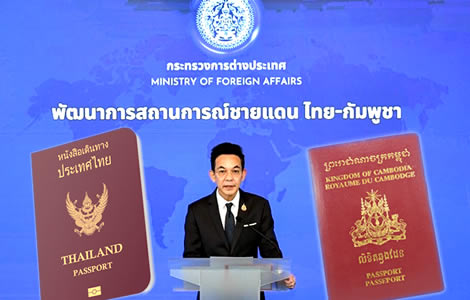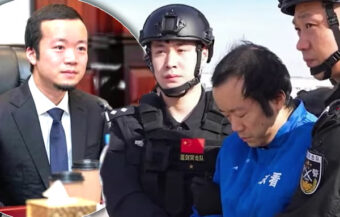Border standoff still poses danger. Thai troops hold firm on border controls despite Cambodian pullback near Chong Bok. Visas slashed to 7 days amid crackdown on trafficking and scams. June 14 talks may calm flames—but nationalist anger and disputed claims keep tensions razor-sharp in both countries and near key flashpoints.
Thailand’s border crisis with Cambodia remains unresolved. Just over 24 hours after Cambodian and Thai forces pulled back near Chong Bok and agreed to cooperate, Thailand maintained its more defensive border stance established on Saturday. Plans to crack down on human trafficking and online scam centres are also moving forward. These include proposals to cut power and internet signals in key border areas. Additionally, both countries announced on Monday that visa durations for each other’s nationals have been reduced to seven days. The two sides are scheduled to meet on June 14th in Phnom Penh for an important session of the Joint Border Commission (JBC), where border issues will be discussed. Despite this, Cambodia reiterated on Monday its intention to take the dispute to the International Court of Justice (ICJ) in The Hague.

Despite Cambodia’s withdrawal from the disputed Chong Bok area on Sunday, Thai forces remain in firm control. Meanwhile, the military continues patrolling tense border zones. Indeed, pockets of Cambodian troops reportedly pulled back. However, Thai forces stayed camped near disputed points.
Border restrictions and controls remain in place. Indeed a renewed security crackdown has begun targeting human trafficking and scammer gangs.
On Monday, officials admitted the crisis is far from over. Instead, Thailand is pushing urgently for a breakthrough in effective border demarcation.
Historically, disputes stem from colonial-era treaties. After the French withdrawal, treaties between France and Siam left ambiguities. Furthermore, decades of turmoil in Cambodia made old maps unreliable. Additionally, original boundary markers have been lost or moved over time.
Joint Border Commission returns to the spotlight but serious disputes like Chong Bok remain unresolved
Since 2001, both countries have used the Joint Border Commission (JBC). Although the commission has achieved progress, many areas remain unresolved. For example, Chong Bok is still under dispute.
Moreover, on Monday, Cambodia’s Foreign Ministry called for the International Court of Justice (ICJ) to resolve key border areas. However, Thailand has firmly rejected this move.
Meanwhile, both countries are expected to reconvene the JBC in Phnom Penh on June 14. Yet, tensions still run high and could escalate again soon.
In Thailand, nationalist sentiment has surged over the dispute. As a result, political tensions have intensified. Last week, the Pheu Thai-led government initially baulked at some military-led border restrictions. Yet by Friday, this soft approach was abruptly reversed. Consequently, the military regained full control by Saturday and Sunday. In effect, key border areas and zones are presently under martial law.
That apparent reversal for the civilian government may have pressured Cambodia to ease its posture. Notably, however, National Security Council Chair and People’s Party MP Rangsiman Rome proposed similar actions last week as an alternative to armed conflict.
Thailand tightens military posture at the border as Cambodia reaffirms sovereignty over disputed territory
Now, Thailand is pursuing a stronger border security posture. It is tightening crossings and boosting surveillance in disputed zones.
In response, Cambodia’s Ministry of Defense insisted on Monday that its forces had not withdrawn. Instead, it reaffirmed its determination to uphold sovereignty claims in full.
Also on Monday, both countries cut visa durations for each other’s nationals to just seven days. Clearly, diplomatic tensions remain high. Indeed, politics now drives much of the instability.
At 4:16 p.m. on June 9, Foreign Ministry spokesman Mr. Nikorndej Plangoon outlined major developments. He said both Thai and Cambodian forces jointly surveyed the border and reburied markers per their 2024 agreement. Furthermore, troops repositioned to match the agreed lines from last year. As a result, he described the move as a “positive signal.” Indeed, he said it reflected Cambodia’s sincerity in de-escalating the crisis.
Moreover, Mr. Nikorndej emphasized these steps aim to set a constructive atmosphere for the upcoming JBC meeting. In his view, the meeting could lead to a peaceful, long-term resolution.
Hopes for long-term peace pinned on JBC talks and goodwill gestures ahead of June 14 Phnom Penh summit
Since its establishment in 2001, the JBC has held ten sessions—five regular and five special. The last took place in 2012, in Bangkok. Importantly, the commission has delivered tangible outcomes. These include the Thai–Cambodian Friendship Bridge and infrastructure at Ban Nong Iam–Stung Bot. Additionally, a new cross-border bridge is now under construction at Ban Pakkat in Chanthaburi.
Looking ahead to the June 14 meeting, Thai officials hope it will ease fragility across the border. Indeed, Mr. Nikorndej stated that Thailand will engage “with honesty and sincerity.” He also reaffirmed Thailand’s faith in regional mechanisms, including the Thai–Cambodian Border Committee (GBC), Regional Border Committee (RBC) along with civilian and military dialogues. Furthermore, Thailand aims to promote stronger relations between border communities as an ASEAN goal for peaceful coexistence.
Nevertheless, security concerns remain urgent. Thus, border-control measures are being assessed based on evolving intelligence.
Meanwhile, the Centre for the Operation of Prevention and Resolution of Threats (OCOCD) is escalating its measures. These include electricity and internet cuts in known gambling and scam dens next to the border. Additionally, authorities will monitor suspicious goods that might facilitate tech-enabled crimes or human trafficking. The measures are long-term and will require National Security Council approval.
Finally, Mr. Nikorndej urged media and public cooperation. He called on everyone to avoid spreading unverified claims. Instead, he urged reliance on factual information. Without it, misunderstandings may spark unintended conflict.
Border talks are still on track but fragile progress leaves major issues unresolved just days before the summit
When pressed about formalities on June 14, he confirmed the JBC meeting is still scheduled. Both sides have committed to attending in Phnom Penh. However, Cambodia had earlier prohibited discussing four disputed zones. Yet both nations are negotiating a meeting agenda. Therefore, only time will tell if an agreement can be reached.
Visas remain short-term—just seven days until further notice. Both sides say they’ll revisit restrictions once conditions improve. For now, they say visa length is not the main issue.
When asked if border residents fear violence, Mr. Nikorndej replied that tension has eased. However, he stressed that the situation remains fragile. Thus, officials continue cautious engagement on both sides.
Likewise, Cambodia’s Defense Ministry on Monday affirmed that its troops remain fully deployed. The ministry stressed all deployments abide by sovereign territory claims. Furthermore, it said the Royal Cambodian Army is prepared to support peaceful JBC-led demarcation efforts—except where sovereign claims are submitted to the ICJ.
Meanwhile, Cambodian officials urged the public and media to rely only on official sources. False information, they warned, could escalate tensions further.
Military briefings delivered to foreign attachés as Thai army justifies security push near Cambodia border
On security coordination, Thailand’s army dispatched briefing documents to 42 assistant military attachés from 26 diplomatic missions. According to the army, the materials outlined how Thailand is managing border crossing closures to protect sovereignty. Also, they highlight efforts to combat online scams, gambling rings and human trafficking.
The army asserts these measures align with international norms. Moreover, it says cross-border crime threats warrant extra controls. Nevertheless, the Ministry of Foreign Affairs cautions that actions should not unduly impact border communities.
Meanwhile, army leaders remain vigilant. Lieutenant‑General Nutt Sriin, Deputy Commander of Army Region 2, praised Thai restraint. Yet he warned that future problems may not be solved so smoothly. Thus, officials are keeping troops alert and ready.
Likewise, Defence Minister Phumtham Vejjayachai expressed gratitude for military patience. However, he cautioned that the first bullet could spark uncontrollable conflict. In addition, he thanked Thailand’s military attaché in Cambodia tasked with coordinating de-escalation efforts.
Joint patrols resume but tensions persist as legal resolution to border conflict remains elusive for now
Furthermore, joint patrols have resumed in some buffer zones. Specifically, Thai and Cambodian forces now patrol together around Chong Bok. This marked a shift toward cooperation—though far from comprehensive peace.
Still, the border dispute isn’t legally resolved. Yet both sides vow to avoid armed conflict. Again, both nations will press the JBC to resolve the most disputed zones. Notably, technical delegations—including Thai survey and treaty officials—will attend next week’s meeting.
Cambodian troops withdraw from near Chong Bok but questions still remain over this week’s border crisis
Martial law declared in border areas with Cambodia as military takes command of Thailand’s tense standoff
Thai Cambodian border tensions worsen as matters threaten to spill over into the kingdom’s politics
In summary, the Thai–Cambodia border situation hinges on diplomacy under heavy military oversight. With both sides backing multi-layered talks, there is hope. However, unresolved claims, nationalist politics and the potential for escalation remain clear threats. The next five days—and the June 14 JBC meeting—are crucial to determine if stability takes hold or if instability resurfaces.
Join the Thai News forum, follow Thai Examiner on Facebook here
Receive all our stories as they come out on Telegram here
Follow Thai Examiner here
Further reading:
Dangerous impasse between Thailand and Cambodia as PM rules out International Court of Justice (ICJ)
Hun Manet confirms Cambodia ultimately may decide to send border dispute with Thailand to the Hague
Khmer soldier killed in deadly gunfire between Thai and Cambodian armies near Ubon Ratchathani


















